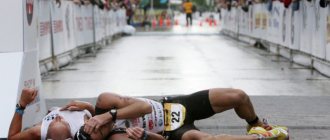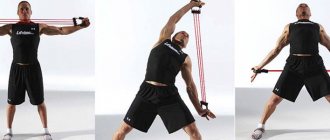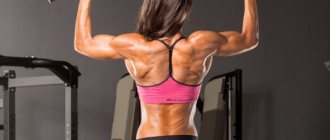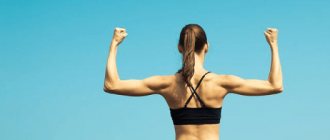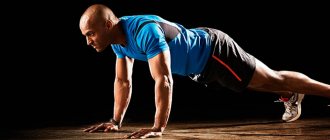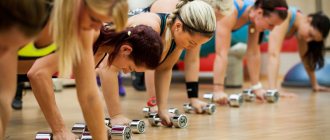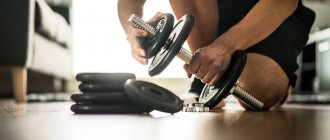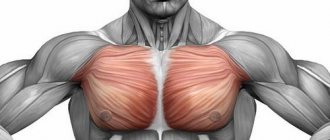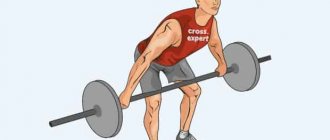Excuse for the lazy
The fact is that the statement “I have bad genetics, so I don’t grow,” often serves as an excuse for lazy bodybuilding enthusiasts who do not want to work in the gym the way they need to work in order to gain at least a kilogram of muscle mass. I declare responsibly: absolutely everyone can train their body through physical exercise. Nowadays “bad genetics” plays the role of an excuse, so you can understand those famous bodybuilders who say that genetics does not matter. However, this does not change the fact that they are lying to you.
Plus to karma
Pay attention to Michael Phelps's foot size. Yes, she's gigantic! Of course, a four-meter arm span along with a 47-foot leg size gives the swimmer additional speed. Or look at how Usain Bolt's body works. It's like it's designed to run as fast as possible. Now imagine the fastest man on Earth, but with short, undeveloped legs. In this case, Bolt could only dream of world records.
There are different concepts of human predisposition. Nasser El Sonbati said that genetics is the body’s ability to process a huge number of different potent drugs without harming health. But he died at the age of 47. Apparently, his body could not cope with such a volume of chemistry.
There is no doubt that Ronnie Coleman, Jay Cutler, Phil Heath, Dorian Yates are genetically unique athletes, of whom there are only a few in the world. But they, of course, are the stars of professional bodybuilding, where goals are achieved by any means necessary.
What does genetics influence?
First and foremost, genetics influences the rate of muscle growth. Everyone can pump up! Everyone can gain 10-20 kilograms of lean muscle mass! However, this will take a couple of years for a genetically gifted person, and for someone who has not been blessed with excellent genetics, it will take 5–10 years. Well, in this case, who will say that genetics does not affect the rate of muscle growth? Genetics is what directly determines how quickly your muscles grow. Genetics and testosterone. Everything else is of secondary importance.
Genetics influences the genetic maximum
Look at the main bodybuilding competition, Mr. Olympia. Almost all the finalists, all the winners of the last Olympias, are black. There are only black bodybuilders on stage, and then someone tells us that anyone can become the first bodybuilder in the world. No, a white man can win Mr. Olympia only if he has incredible willpower and positive genetics, as well as the absence of the same genetics in the black bodybuilder standing next to him. What can we say about amateurs, if among professionals the difference is sometimes visible to the naked eye?
Genetics influences the predisposition to growth of individual muscle groups
And this is the most interesting thing for us. If everyone guessed about the genetic maximum and the rate of muscle growth, then most had no idea about the predisposition to the growth of individual muscles. For example, your pectoral muscles respond to stress much better than your lats. As a result, you become the owner of gorgeous chest and mediocre back. Of course, you might not have been doing proper pull-ups or not paying enough attention to your back, but all other things being equal, some muscle groups will always grow better than others.
Success Factors
So, three genetic characteristics are very important for bodybuilding, these are:
- Testosterone levels. A high level of testosterone is important, because it is this hormone that affects muscle development, metabolic rate and overall figure.
- Constitution type. If we consider exclusively natural athletes, then the advantage will be with the average type of constitution - the mesomorph. This type has large muscle mass and a moderate amount of fat tissue, responds best to stress, has strength and endurance. We can say that mesomorphs are equally good at all types of physical activity.
- Anthropometric data. For example, proportions, shoulder width, ratio of torso to leg lengths, muscle volume, etc. Yes, this is also an important criterion for the best and fastest development of a bodybuilder, because poor proportions can ruin all chances of becoming a successful bodybuilder!
Admit it
Recognize the influence of genetics on your muscle potential and make the most of it. Don't give up on your goals even if you have objectively bad genetics. Bad genetics doesn't mean your dreams won't come true. Bad genetics only means that you will have to achieve those dreams at a higher level of difficulty. Therefore, do not despair. Work on yourself using the information you received today. Pay more attention to lagging muscle groups, do as much to increase muscle growth as others, even professional bodybuilders, do not do, and you will achieve your goal, even with the most disgusting genetics. Undoubtedly, it will be difficult for you to win Mr. Olympia, but poor genetics will definitely not prevent you from building up impressive muscle mass.
Analysis and motivation
Good genetics give you a better chance of muscle growth and allow you to achieve your goals faster. But this does not mean that you can give up hard training in the gym. On the contrary, a positive disposition should motivate one to work even harder to see what limits can be achieved.
But what to do with bad genetics? Even if you are obese, you just need to make it a rule to exercise every day. If you are ambitious, if you are inclined to analyze failures, then you should not look for them in genetics. Rather, it is better to analyze your own natural data and create a proper training program. You may not win the world championship, but your own unique bodybuilding program will help you stand head and shoulders above the average unmotivated gym goer.
Rest and crossing the genetic threshold
It should not be surprising that in order to break genetics in bodybuilding, it is important to devote sufficient time to rest.
Of course, you should train hard and at high intensity. However, scientists have proven that with a constant increase in loads, the secretion of insulin-like growth factor and male hormone decreases. At the same time, the concentration of cortisol increases. All these factors will invariably lead to a decrease in the rate of progress. The body needs rest and you need to provide it. Your training program should include days with low intensity and volume. Simply put, you should use the principle of load periodization. Let's say you increase the load for a month, and then decrease it over the course of one week. After this everything repeats itself.
Secret of success
Bad genetics can also influence it. Persistence, willpower, determination, a serious attitude to business and proper nutrition are the components of success. There are many examples of people with poor genetics achieving outstanding results. These examples can be seen both in professional sports and at the amateur level. Few people know that the current Mr. Olympia Phil Heath in his youth was skinny and too narrow in the shoulders. No amount of medication could make his shoulders broad and round. Many years of work were done, thanks to which the American achieved spherical deltas.
Predisposition to sports and genetics
The health benefits of sports are not even in doubt. However, not many people know that reserves of endurance, strength or speed are genetically determined. In such a situation, effective strength training for some becomes useless and even harmful for others. But the benefits of “classic” running are not noticeable for everyone. So how do you find out your individual aptitude for sports?
Today, about 140 genes are known, various variations of which are associated with the development and manifestation of human physical characteristics, as well as the characteristics of biochemical parameters.
We are primarily talking about:
- the cardiovascular system and its adaptive ability to various types of stress;
- musculoskeletal system and features of the structure and functioning of muscles and tendons;
- and metabolism, which determines the speed and quality of energy produced.
The latter, by the way, can be used to create the most effective diet, as well as to combat excess weight.
Endurance genes
The overall endurance of the body is determined by the genetic characteristics of metabolism. Or, in other words, the ability of cells to produce energy evenly, economically, and at the same time effectively over a long period of time. And also “work” in conditions of reduced oxygen concentration (for example, high altitudes).
Activities that require such energy expenditure include, first of all, marathon running, cycling, mountaineering, hiking, aerobics, football and similar sports.
And among the genes that are significant in this regard, the following are especially distinguished:
- UCP2
- PPARG
- PPARGC1A
- PPARА
- AMPD1
- ADRB2
- HIF1A
- MTHFR
- NOS3
Endurance genes also include ACE, which is responsible for the adaptive abilities of the cardiovascular system. The D-allele of which “increases” the body’s speed and strength capabilities, but is fraught with hypertrophy of the heart muscle. And the normal I-allele favorably distinguishes its carrier in terms of endurance, especially in high altitude conditions.
Genes for strength and speed
These genes are mostly responsible for the contractility of muscle tissue and the characteristics of the tendon apparatus. And the most studied of them include:
- ACE I allele,
- ACTN3,
- NOS3
- CNTF
- L3MBTL4
According to the latest data, in the context of sports achievements, the “well-known” vitamin D is important. It is not surprising that the gene encoding receptors for it (VDR: G>A) is included in most popular genetic complexes “for sports”.
Analysis
The study of significant “sports” genes is widely used today in professional sports. In this case, it is important not only to identify a specific allele of genes, but also their combinations with each other.
In addition, it is always worth remembering that the presence of an allele “useful” for sports can simultaneously serve as a risk factor for certain diseases.
The easiest way not to get confused in the symbols and to get the most comprehensive analysis of the body’s physical abilities is with the help of a geneticist. And if there is no one “in the neighborhood,” then an excellent alternative would be “Opinion of a geneticist on a research report: Choose a sport. Speed, strength, endurance"
The complex contains the 8 most significant “sport” genes with a full decoding and conclusion.
Breaking genetics with negative repetitions
Many athletes focus on concentric repetitions without paying attention to the eccentric part.
You should remember. That in bodybuilding it is important not only to lift weights, but also to lower them. Scientists have found that negative repetitions can stimulate muscle growth more than positive ones. This fact is probably due to the fact that the negative phase of movements is more capable of causing more damage to tissues. It should also be noted that this method increases metabolic stress. To perform negative reps, you will need to use a working weight that exceeds your one-rep maximum by 105 to 120 percent. Perform as many negative reps as possible. To use this method of overcoming genetics in bodybuilding, you will need the help of a friend whose task is to lift the sports equipment. You need to lower it under control.
These days, most people have a negative attitude towards bodybuilding, especially when it comes to the competitive aspect. The appearance of Mr. Olympia impresses not many people, and you can’t argue with that, because there are no comrades according to taste and color, well, except perhaps in your gym. The rest of society equates the terms: steroids and competitive bodybuilding. If you think carefully, it becomes clear where such a myth came from.
Go to any competition in this sport and you will be surprised how different the athletes on stage are from the spectator athletes. The latter, in turn, ask a simple question: “What am I doing wrong? Why don't I look like that guy from the stage? Contrary to popular belief, the issue here is not the use of steroids. No, our editors are not at all going to start another discussion about whether bodybuilders use steroids or whether it’s all a myth. We just want to tell you that this is by no means the only, and not the main reason for such noticeable differences in your body. Genetics It just so happens that bodybuilding is one of the most “genetic” sports. Let us explain this term to you. Competitive bodybuilding is a sport for only a few. If nature had a genetic potential, then you can still think about going on stage, but if you didn’t have it, then you probably won’t be able to perform in front of the audience, and steroids won’t fix this at all. Let us remind you of one interesting fact. In any sport, three or four indicators can play a key role: strength, endurance, speed, agility. Any person can develop these aspects, and this is a scientifically proven fact. Let's take strength sports as an example. You can develop several muscle groups and compete in bench press or Russian press competitions, but will this allow you to compete in bodybuilding tournaments? Definitely not. What does bodybuilding essentially require of us? – Changes in the whole body, i.e. muscles. Moreover, we are talking about uniform development, which can only be seen in performing athletes. Indeed, not every gym goer can develop in a balanced way. As a rule, typical pictures are observed: developed arms - no deltoids, developed chest - no legs, etc. Many begin to vehemently protest, saying that without using steroids it is impossible to develop muscles in a balanced way. We hasten to disappoint such “professors”; in fact, it is possible, and even necessary! No to amateurs Do not be an ignoramus who believes that by drinking a “magic” pill, an athlete can easily correct genetic deficiencies and develop all lagging muscle groups. Steroids play only the role of assistants, but nothing more. Many athletes to this day are looking for that “secret” combination of drugs and training courses that together will provide them with phenomenal results. They believe that professional athletes have been hiding this information from them for 50 years. In fact, there are simply no such schemes. It's all about your DNA, it determines how far you will go in this difficult sport. Arnold Schwarzenegger and the Great Delusion Every amateur considers it his duty to shove photographs of young 18-year-old Arnie in your face, proving how untalented he was and what he achieved thanks to “magic” pills. As an answer, introduce your interlocutor to photographs of 16-year-old Arnold. Look what he has achieved in just a few years. It doesn’t occur to many that in those days even simple meat was in short supply, let alone the various steroid drugs that were used in medicine. Let us remind you that Arnie joined the army so he could eat normally. In those days there was no insulin, no growth hormone, and certainly not IGF-1. The key to success is you. All this is only available now, and, unfortunately, synthetic hormones (steroids) are taken more often than we would like. Many athletes like to blame genetics, saying that the result does not progress because of genes. In fact, everything is in your hands. Of course, you may not be able to become a competitive bodybuilder, but anyone can gain at least 90 kilograms of pure muscle mass, and all this without all kinds of steroids. The fact is that many simply ruin their genetic potential in various ways: improper training, overtraining, lack of supercompensation, abnormal nutrition, use of steroids, etc. All this kills the very “hated” genetics. Don't waste money and time looking for "magic" pills, buy natural foods and sports supplements instead. Start learning the theory, and progress will follow by itself. Ultimately, your body should be built based on the following factors: - alternating training programs; - healthy lifestyle; - good dream; - proper training; — some food supplements and vitamins; - regular meals.
Compliance with such conditions will allow you to achieve great success in bodybuilding. And believe me, the term “bad genetics” is considered only in competitive bodybuilding. In practice, each of you can develop impressive muscle mass.
Remember this.
For fitness
A DNA test for sports is just as useful for fitness classes or rehabilitation exercises.
A genetic study of heredity in the hands of a modern, qualified trainer will improve the quality of his recommendations and help achieve the best results in the shortest possible time. Sleep mode, balanced nutrition, training schedule and intensity of exercise per approach, the number of these approaches - all this can be individually and precisely adjusted like never before.

